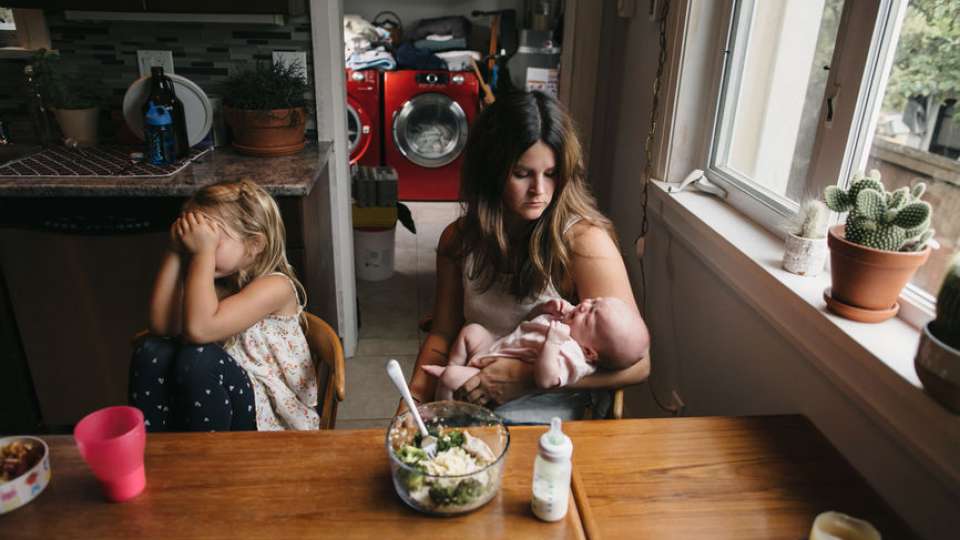Do I Have Postpartum Depression or Just the Baby Blues?

The ordeal of childbirth is behind you, and you’re home with your bundle of delight, handling diapering, swaddling and feeding like a pro. With every breath, you experience the pure unadulterated bliss of new motherhood while feeling as perfectly put together as Kate Middleton always appears just after giving birth.
If this sounds like an accurate portrayal of new motherhood, it’s probably because you’ve watched too many laundry detergent commercials.
Not only are you dealing with the regular chaos of domestic life plus more laundry than you ever imagined possible (note to self: buy more detergent), chances are high you’re feeling exhausted, dazed, and likely to cry at the drop of a hospital-issued newborn hat (or onesie or blanket or binky or…).
“There’s a cultural expectation that pregnancy and the postpartum period will be joyful. It can be, but very rarely is it uniformly so,” says Amritha Bhat, M.D., a psychiatrist who sees patients at the Perinatal Psychiatry Clinic at UW Medical Center-Roosevelt.
Welcome to the baby blues
Marked by moodiness and lots of tears, the baby blues are very common, with up to 80 percent of women experiencing them after giving birth.
Hear that, new mama? It is totally normal to be ultra-weepy and emotional after you’ve given birth.
“A new mom is experiencing major physiological and social changes all at once,” says Bhat. “Drastic changes in hormones, relationships, basic human needs like sleep, a role transition of becoming a parent, sometimes a pause in career, societal expectations about how much time she will take off work, whether she will return to work, how to parent, whether she will breastfeed, not to mention logistical stressors like child care.”
It’s no wonder a vast majority of women feel overwhelmed and teary in the face of all this.
If the baby blues are going to strike, they will within a few days of giving birth and typically last 7 to 10 days. They manifest as frequently changing moods, irritability and lots of crying—but with a base of happiness or contentment underneath, says Bhat.
But what if it’s postpartum depression?
“The baby blues can feel very distressing, but they will go away in days,” says Deborah Cowley, M.D., a psychiatrist who sees patients at the Perinatal Psychiatry Clinic at UW Medical Center-Roosevelt. “Postpartum depression is much more severe and persistent.”
Postpartum depression, which affects about 1 in 7 women in the U.S., manifests as a pervasive, unshakable sadness or hopelessness and/or feeling completely overwhelmed or desperate.
The exact causes aren’t fully understood yet, but it’s likely a combination of drastic shifts in hormones combined with sleep deprivation and all those aforementioned major life changes. It can start anytime within a year of giving birth or even during pregnancy and can last anywhere from weeks to months.
Some women are more at risk of developing postpartum depression. This includes women with a personal or family history of depression or bipolar disorder, a stressful life event during pregnancy or shortly after giving birth, medical complications during birth, and a lack of social support.
Talk to your doctor if you think you might be depressed (always!)
If your feelings of sadness or being overwhelmed last more than 10 days, it’s time to seek the help of a medical professional.
You can bring up your feelings with your OB-GYN or other primary care provider. Some pediatricians screen moms for postpartum depression as well, and they will be able to guide you toward help. Your provider will help sort out the right treatment for you—typically talk therapy, with or without the addition of medication.
Remember that postpartum depression and feeling less than ideal after you’ve had a baby is not at all uncommon.
“Women can feel ashamed to feel bad when the cultural expectation is that they’re supposed to be overjoyed to be a mom,” says Cowley. “But postpartum depression is not your fault or an indication you’re doing something wrong.”
Taking care of yourself while you’re taking care of a new baby
Whether you’ve got the baby blues or are feeling great, Bhat offers these universal motherhood tips:
Protect your sleep
Rest when your baby is sleeping. Don’t use this time to check your email or do the dishes, unless those things really and truly bring you happiness. (Really? Truly?) Try to protect your sleep and overlap your sleep with your baby’s as much as possible.
Make time for you
It’s easy for parenting to take over your life, so now is a great time to get into the habit of keeping some time for yourself. Try to take at least 30 minutes every day or (let’s be real) at least a few times a week.
“Remember that caring for yourself is caring for your baby,” says Bhat. “The quality of time with your baby is more important than the quantity. It’s important that you are in good shape to provide care.”
Accept help
Don’t feel like you have to do everything yourself. Whether it’s someone offering to bring you food, take care of the baby for an hour, or sweep your kitchen floor, say, yespleasethankyou.
Recognize if it’s getting to be too much to handle in any given moment. If your baby is crying a lot and you feel yourself reaching the threshold of “I just don’t know what to do,” put the baby down and ask for assistance.
Don’t let cultural expectations (or laundry commercials or perfectly-coifed royalty) prevent you from talking about how you feel and getting the help you might need.
“Be greedy and take all the help that is offered,” advises Bhat. After all, you deserve it—you just created another human being.

 Healthy ideas for your inbox
Healthy ideas for your inbox





